Libraries go astray
Rainbow Storytime is not a free speech issue.
Last week a planned Rainbow Storytime at Rotorua library was cancelled after threats of violence were allegedly made against the event.
The Free Speech Union stated on Facebook, “This is a terrible decision by Rotorua City Council… We will be contacting the City Council for an explanation into why they are caving into threats of violence against legal speech.”
LIANZA (the Library and Information Association of New Zealand Aotearoa) put out a press statement “calling out disrupters of events in libraries all over the country during Pride Month and Rainbow Storytime Events.”
RGE begs to differ with both organisations. Although we condemn any threats of violence, we welcome the cancellation of this inappropriate event. Unfortunately, it has been cancelled for the wrong reasons.
First, let’s hear what one of these Rainbow Storytime events was like, when an RGE member attended in 2022.
Overtly sexual behaviours and costumes were not used. Erica (a man) was dressed like an extreme version of Dolly Parton in the 1950s (see photo above). Coco (a woman) was dressed like a feathery cheer leader with a huge wig. The performers stated that they consciously make their message ambiguous, so that their call for acceptance can be applied to a range of diversities and that their drag queen personas are no different than dressing up as pirates or clowns.
They read three books about feeling different as a child but growing up to be wonderful - the Ugly Duckling type of story. There was nothing concerning about the content of any of the chosen books.
The event our member attended was for children aged 12+ and a Q&A session followed with a promise that no question would go unanswered, a glaring safeguarding concern.* However, all the questions that day were about Erica’s passion for dressing as a woman - “How do you choose what dress to wear?”, “How long does it take to put on your makeup?” etc. Erica basked in the attention, while doing that definitively feminine behaviour of continually fanning himself.
Many parents and librarians seem to have concluded that because the overt content of the event is unconcerning, the whole event is harmless. But it is the hidden messages being given to our children that concern RGE and the fact that the libraries hosting these events are taking a partisan position on the very contentious issue of transgender ideology. These events endorse the belief that if a man puts on a dress, he becomes a woman and, by extension, that children can literally change their sex.
*When relationships and sexuality is taught in schools, by qualified teachers, parents are able to view the content before the lessons so that they can make an informed decision on whether they want their child to attend each class. This opportunity for informed consent is missing from the Rainbow Storytime events for older children.
RGE believes public libraries should not promote Rainbow Storytime and these are our reasons:
Message good / Delivery bad
Erica and Coco say that their drag queen personas are no different than dressing up as pirates or clowns. While we support the performers’ message of self-acceptance, we do not think that drag queen costumes are at all necessary for its delivery. The positive message could be just as easily conveyed from a pirate or clown costume, without introducing children to the underlying sexualised meanings of drag.
The stated purpose of Rainbow Storytime is to “promote the importance of inclusivity, diversity and self-acceptance”. These worthwhile goals would be easy to achieve without introducing children to adult sexualised characters and actors wearing costumes that are a mockery to women. A lesbian or gay couple reading would do a lot more to teach children about diversity than will two people who are dressed as drag queens – behaviour that most children will not encounter in everyday life.
We also question how girls in the audience will learn self-acceptance by seeing women’s clothing and mannerisms being mocked and why it is admirable for boys to see adult males painting women as ludicrous.
If Drag Queens are suitable readers for children, why not strippers or porn stars? The answer, of course, is that the vast majority of parents do not want any of these people to be presented as role models to their children. That some parents eagerly bring their toddlers to the Drag Queen sessions demonstrates that they are as blinkered as the libraries to the real messages their children are learning.
Drag Queens are sexualised adult performers
It is a mystery how a niche form of sexualised adult entertainment has suddenly been elevated to become the preferred symbol for everything Rainbow. Dressing as a drag queen is a choice for a very small number of men and does not relate to children’s experience, even those with same-sex parents. Children do not need to learn to be inclusive of men dressed outrageously; they need to see that some children have two mothers or two fathers and developing that sort of inclusivity does have relevance to them.
Drag Queens reading to young children is a craze imported from the US. In that country, the push to normalise “kinky” adult sexual behaviour in public is well under way. In 2021 an op-ed in the Washington Post entitled “Yes, kink belongs at Pride. And I want my kids to see it” drew a lot of criticism, including this response. https://www.washingtonexaminer.com/opinion/no-children-dont-need-to-see-kink-at-pride-parades The writer correctly identifies the trend of deliberately exposing children to sexualised adult behaviours as “tantamount to emotional and psychological abuse”.
This photo is from a show in the UK in March 2023, proving that what might start as harmless ‘glitter and sparkles’ can lead on to presenting sexualised content to children.
Under the same stage names, Erika and Coco perform R18 shows. This means that children who attend the public library sessions can easily google the performers’ names and reach online adult content. Censorship laws do not allow children under 16 to be exposed to “adult themes” so what measures are libraries taking to ensure minors will be safeguarded from this content, according to the law?
The hidden message
When Drag Queens are presented to small children as role models by reading to them, adults are undermining children’s natural wariness. The message of this show is not only one of self-acceptance; hidden beneath the flamboyance is a message that adults who provide colour, fun, and glitter can be implicitly trusted. Would parents really encourage their children to seek help from or open the door to a stranger dressed as a drag queen? Yet that is the underlying message of Rainbow Storytime – trust a strange adult, no matter what.
Libraries that host Rainbow Storytime need to open their eyes to the big picture behind these seemingly innocuous sessions.
Drag Queens reading to children is not a way of modelling freedom, being yourself, or being kind; it is showing children a side of life they are not emotionally ready to understand and teaching them that lampooning women in a sexualised way is normal and acceptable behaviour.
Double standard and excuses
Libraries often defend Rainbow Storytime by saying that the kids love it. That is no measure of the suitability of a show – kids also used to love the Black and White Minstrel Show but it is certain no library today would endorse that. The ultimate double standard is the one being practiced by libraries, where they would not dream of hosting anyone wearing “blackface” but are happy to welcome actors in “womanface”.
Another excuse libraries use is that “LGBTQ+ people are part of our communities” and “Libraries should be a dynamic part of community life for everyone.” This is where many libraries have gone astray. Using that excuse as a principle would mean libraries should also invite pole dancers and sex workers to read to children because they also are part of our communities.
Drag Queens do not represent diversity or the rainbow community. They are no more than adult entertainers dressed up in a sexualised way. Many of them, in fact, are heterosexual men, cosplaying womanhood for laughs. Straight men putting on costumes does not teach children anything about diversity. For lesbian women it is pafrticularly galling to have men who make a living from mocking women being lauded as somehow representing them.
This adult sexualised entertainment business does not belong in libraries under any guise.
Libraries taking sides
Erika Flash himself offers a different excuse: “If you don’t like drag queens, don’t come to our shows.” That would work if his shows were using a private room in the libraries and were privately funded and independently promoted, but that is not the case.
Libraries are pro-actively engaging these performers and jointly promoting the events.
Rainbow Storytime is a private business that charges fees. Libraries do not normally support any private businesses, so why is an exception being made for this one? Libraries are supposed to be neutral, non-commercial spaces, for the benefit of all citizens, as stated in this National Library report: [libraries have a] broader symbolic value in terms of offering politically neutral, non-commercial and safe community spaces which support democratic and civic processes and as a 'third space' which supports wellbeing.
Rainbow Storytime is strongly connected with Pride and the extremist push to medicalise children into transgender identities. This is an activist political campaign where libraries would ordinarily remain strictly neutral.
By so blatantly taking a side in the contentious issue of gender identity ideology libraries are alienating the many ratepayers who do not adhere to those beliefs. More disturbingly, they are introducing children to concepts that they are not developmentally ready to understand. (See our last substack “When kindness becomes cruelty”)
Rainbow Storytime is laying the groundwork for children’s indoctrination into the unscientific gender identity belief that humans can literally change sex.
Ratepayer money should not be used to promote any ideology and libraries should revert to being politically neutral spaces, with library staff remaining non-partisan in all instances.
RGE calls on all libraries to cease supporting Rainbow Storytime because they should not be participating in the promotion of an ideology that is demonstrably causing harm to children.
Questions to ask your mayor, library, and MP:
What is the cost to the library and/or ratepayers (including library staff supervision time) for this event?
What background checks were carried out, and how was the decision reached that these adult entertainers are appropriate to perform in the library?
What measures is the library taking to ensure minors will be safeguarded from adult content during a Rainbow Storytime performance, according to the law?
How can parents give informed consent to their children hearing sexual content when the performers advertise that they will answer any impromptu question from the audience?
Libraries do not normally support any private businesses, so why is an exception being made for this one?

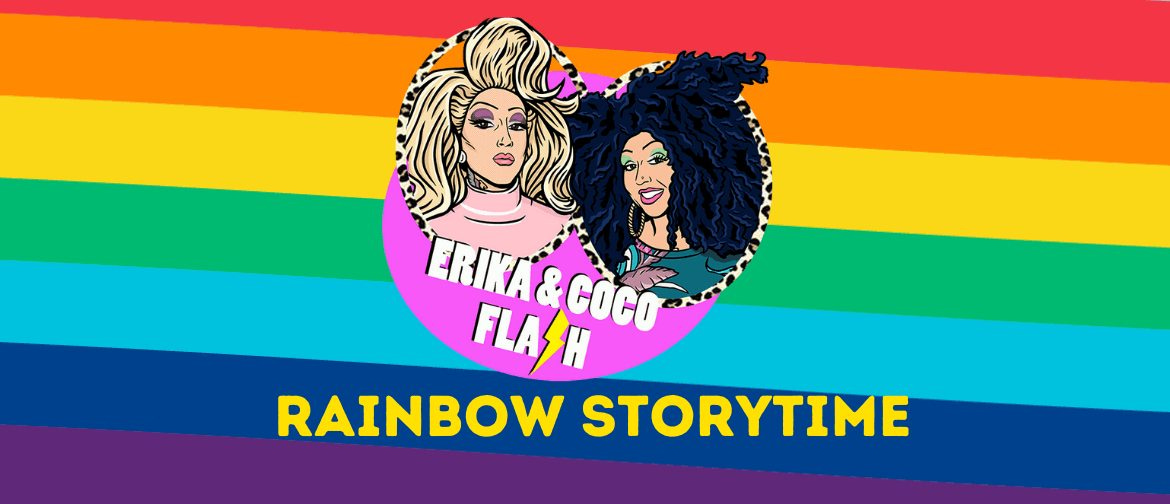
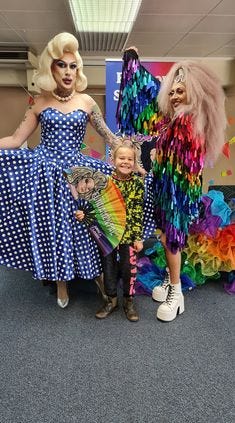
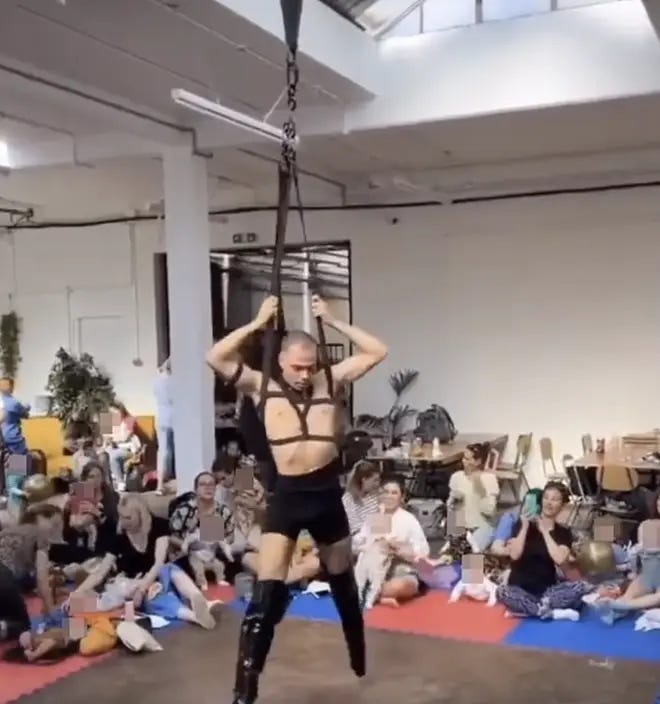
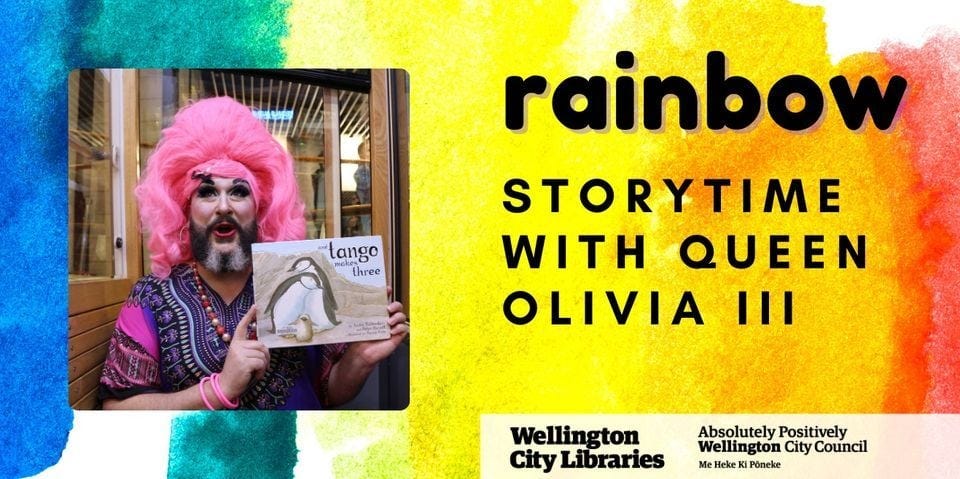
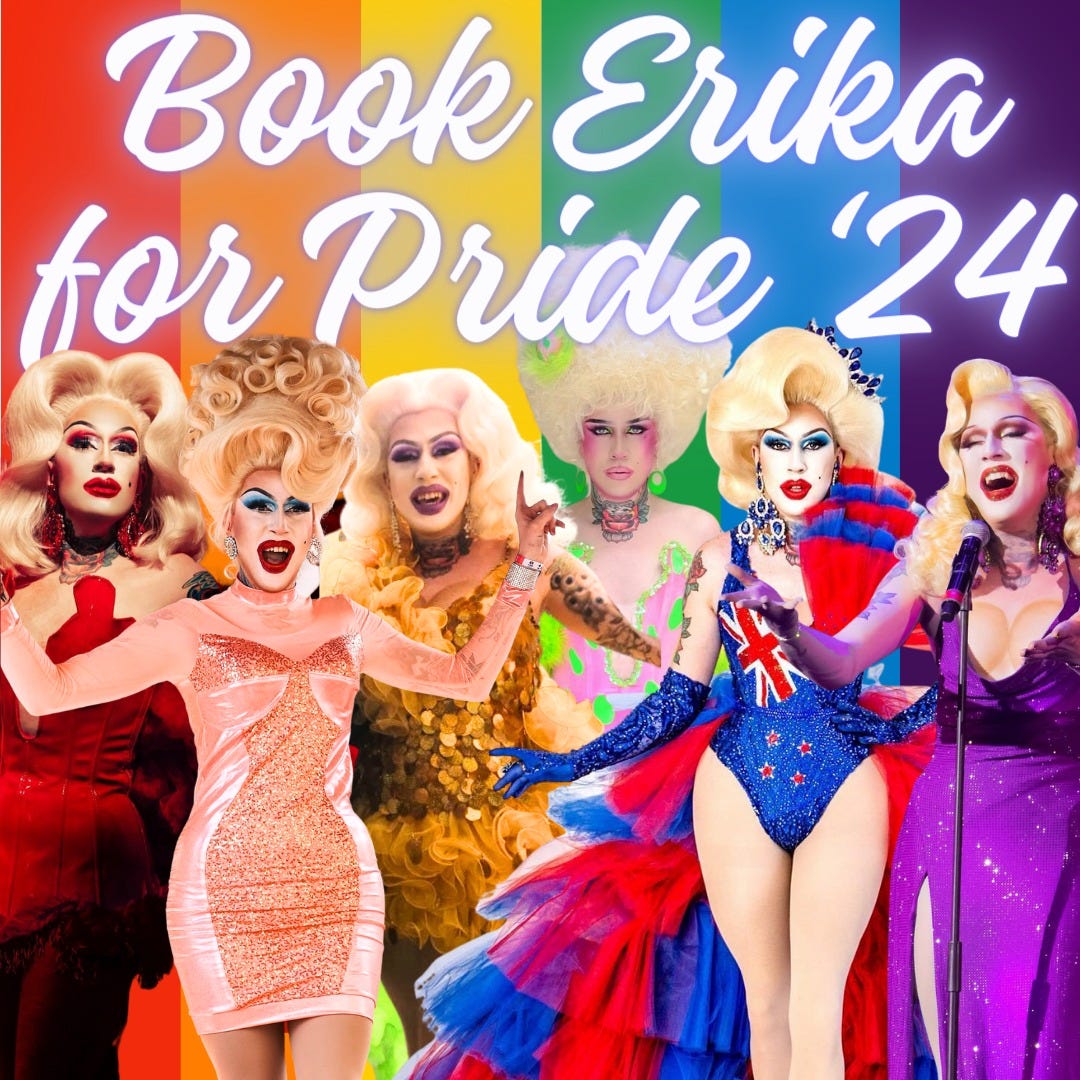
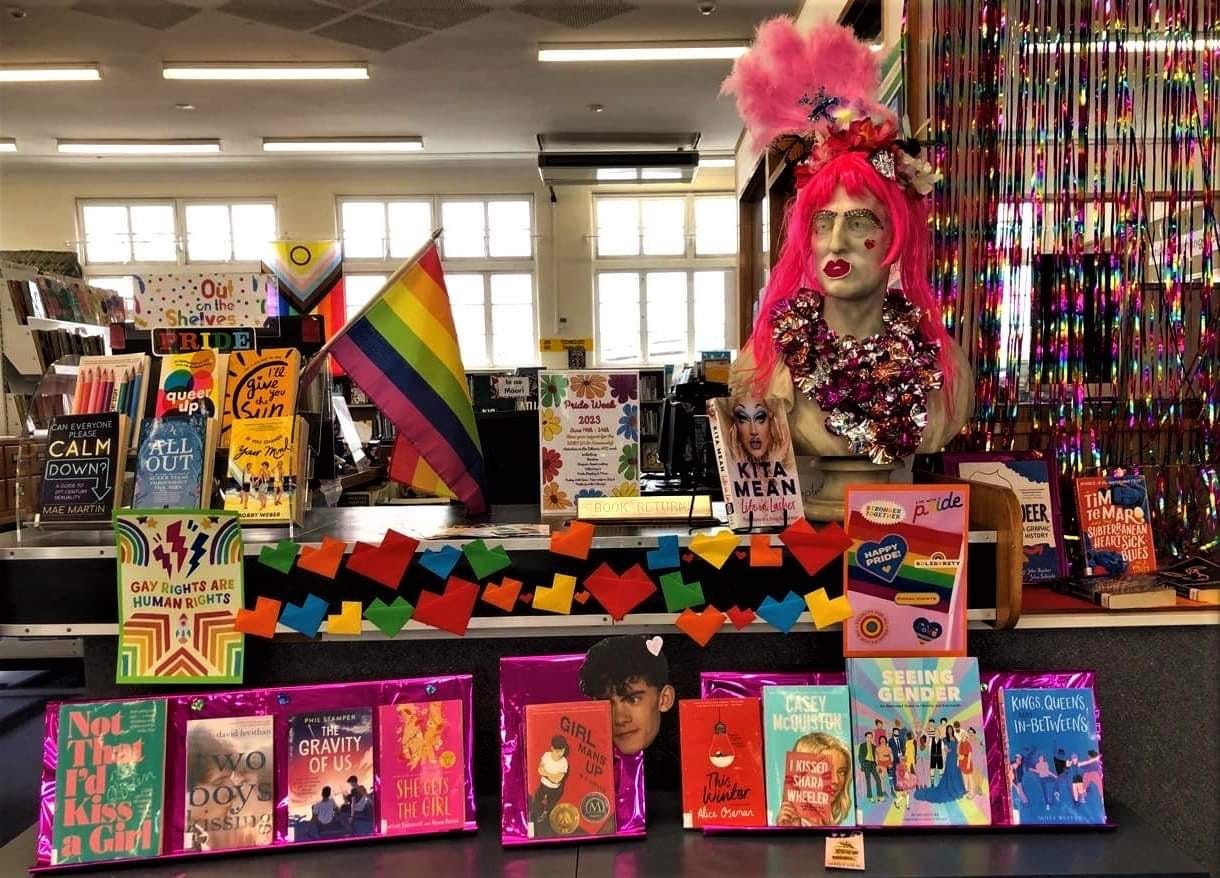
I note the story time attended by an RGE member was for children 12+ years and I am wondering what the real purpose of this was, considering that (in theory) every 12+ student probably considers themselves a bit past the being read to age? I was already reading young adult novels at 12 by myself. At 12, children are prime targets for those who seek to use them to further their own means; "catch 'em early and you've got them for life" has been used by corporations for decades to ensure future profits.
I agree with those who say that if drag queens are good entertainment, then why not strippers or other forms of "adult entertainment"? Parents have a duty of safeguarding their children, which clearly some don't manage. This piece has some photos of some other DQSHs that are deemed acceptable for children, but I disagree: https://lucyleader.substack.com/p/what-the-hell-is-wrong-with-parents
It's like Stripper Story Time. Sure, they could dress more demurely for the kids, but it's essentially a lie, because actual drag or stripper culture is very oriented towards sex.
So why would we want to fool ourselves or our kids into believing otherwise?
Drag is not appropriate for kids, no matter how it's marketed.
The founder of DQST was very clear about its purpose - to indoctrinate kids into Queer Theory (Which advocates for among other things the removal of age of consent laws):
https://www.tandfonline.com/doi/full/10.1080/03626784.2020.1864621